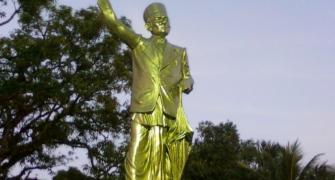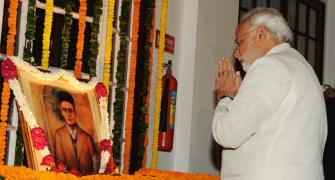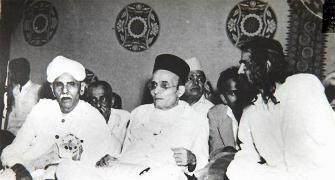Savarkar believed Swarajya is more than the mere geographical independence of a stretch of earth called India.
There was no point in fighting and sacrificing one's life for a Swarajya (mere territorial independence) at the cost of our Svatva (self-existence) or Hindutva itself!
A revealing excerpt from Uday Mahurkar and Chirayu Pandit's Veer Savarkar: The Man Who Could Have Prevented Partition.
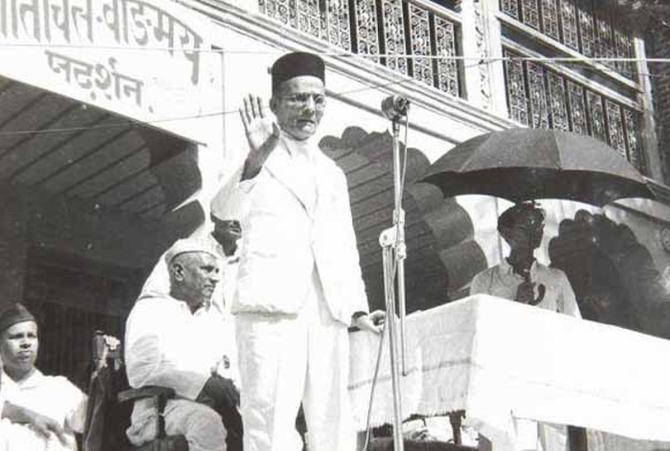
Savarkar maintains that Hinduism in general is used to indicate Vedic faiths.
However, non-Vedic faiths such as Jainism, Buddhism, Sikhism and even faiths such as animism have originated in the Hindu Holy Land.
Therefore, 'Hinduism' means the 'ism' of the Hindu -- like of Indic faiths or league of all 'isms' of Indian origin-- meaning primarily all the people who reside in the land that extends Sindhu (Indus) to Sindhu (Ocean).
Savarkar believed that Indian Muslims, even if they profess a different religion, can be considered Hindus, since they are citizens of Hindusthan and the words 'Hindu' and 'Indian' have the same origin.
Savarkar was ready to call Muslims Hindu with some prerequisites, which he had evolved.
He said, 'It may be that at some future time the word Hindu may come to indicate a citizen of Hindusthan and nothing else; that day can only rise when all cultural and religious bigotry has disbanded its forces pledged to aggressive egoism, and religions cease to be 'isms' and become merely the common fund of eternal principles that lie at the root of all that are a common foundation on which the Human State majestically and firmly rests.'
What he meant was till such a world evolves, the distinctions based on religion and culture would remain.

Significantly, in a letter to the Shias of Lucknow, Savarkar once wrote, '...Whoever thinks that this Hindustan is not only their birth land but also their religious land, Holy Land and Fatherland, are all Hindus for us.'
He also had very positive things to say about the Muslim Bohras's and Muslim Khojas's love for the nation.
He further contends that Hinduism must necessarily mean the religion(s) that are peculiar and native to this land and its people.
If we are unable to reduce the dissimilar tenets and beliefs to a single system of religion, we will cease to maintain that Hinduism is a system and to consider it a set of systems consistent with, or contradictory or even conflicting with, each other.
Savarkar averred that no nation has ever been free from sects and sections, dissimilarities and differences within its fold.
He says, 'A nation is not marked out as a separate unit because its people have no subdivisions and diversities amongst themselves but because they, as a whole, present a more homogeneous unity amongst themselves than they have in common with all other alien national units; because they differ definitely and immensely more from all other peoples in the world than they differ amongst themselves from each other.'
Using examples from around the globe, Savarkar proves that Hindus are a nation by themselves.
No people on the earth are so homogenous as to present perfect uniformity in language, culture, race and religion.
Even those who deny the fact that the Hindus could be called a nation by themselves, do recognise Great Britain, the United States, Russia, Germany and other peoples as nations.
What is the test by which those peoples are called nations by themselves? Take Great Britain as an example.
There are at any rate three different languages there; they have fought amongst themselves dreadfully in the past, there are to be found the traces of different seeds and bloods and race.
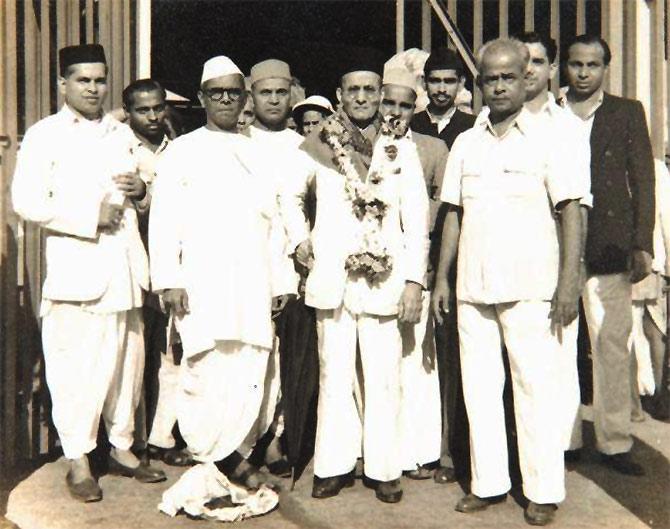
Savarkar argued that if on the basis of just a common language, a common culture and a common Holy Land the Western nations claimed nationhood, then Hindus had a greater claim to be called a nation since they too possess a common country so well marked out as Hindusthan and a common language, Sanskrit, from which all their current languages are derived/nourished and which forms even today the common language of their scriptures and literature.
After all, Sanskrit is a language that is held in high esteem as the sacred reservoir of ancient scriptures and the tongue of their forefathers.
Justifying his stand further that the Hindus were a nation by themselves, Savarkar said their social festivals and cultural forms are not less common than those we find in England and they (Hindus) also possess a common Holy Land.
Dwelling further on the features that constitute a nation, he said the Vedic rishis are the Hindus' common pride; their grammarians Panini and Patanjali, their poets Bhavabhuti and Kalidas, their heroes Shri Ram and Shri Krishna, Shivaji and Maharana Pratap, Guru Gobind Singh and Banda Singh Bahadur are a source of common inspiration.
Savarkar saw the Hindu caste system as quite flexible and explained that through the practice of Anuloma and Pratiloma (inter-caste marriages), their seed and blood continued to get commingled since the days of Manu.
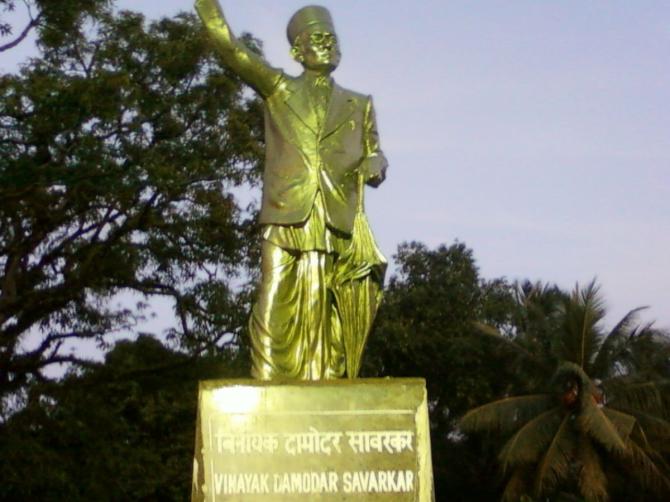
Explaining further, Savarkar said the Hindus' prophets, Buddha and Tirthankara Mahavira, Kanada and Adi Shankaracharya, are held in common esteem and like their ancient and sacred language, Sanskrit, their scripts too are fashioned on the same basis and that the Nagari script has been the common vehicle of their sacred writings since centuries.
Lending an emotional touch but steeped in realism, he further said the Hindus' ancient and modern history are common and similarly their friends and enemies are in common and that they have faced common dangers and won common victories.
Taking his line poetically forward, he said that the Hindus are one in national glory, one in national disasters, one in national despairs and one in national hope and they are welded together during eons of a common life and a common habitat.
However, above all, he said that Hindus are bound together by the dearest, most sacred and most enduring bonds of a common Fatherland and a common Holy Land, and these two being identified with one and the same country, our Bharatbhoomi, our India, the National Oneness and homogeneity of Hindus have been reasserted.
If the United States, with its warring crowds of African-Americans, Germans and Anglo-Saxons, having a common past not exceeding four or five centuries, put together can be called a nation, then Hindus must be entitled to be recognised as a nation par excellence, Savarkar emphasised.
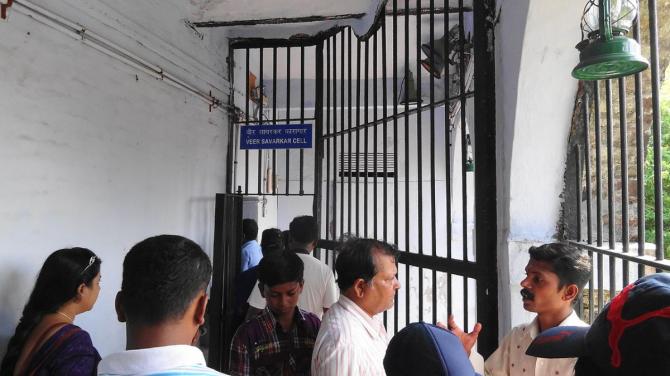
Truly, Hindus as a people differ most markedly from any other people in the world than they do amongst themselves, Savarkar remarked and asserted that 'all tests whatsoever of a common country, race, religion and language that go to entitle a people to form a nation, entitle Hindus with greater emphasis to that claim'.
And finally he observed with hope that whatever differences divide Hindus amongst themselves are rapidly disappearing owing to their awakening of the national consciousness and the Sangathan and social reform movements of today.
Savarkar maintained that our country was endeared to us because it had been the abode of our race, people, and our dearest and nearest relations.
India's independence meant the independence of our people, our race and our nation.
Therefore, he emphasised that as far as the Hindu nation was concerned to Hindus, Indian Swarajya or Indian Swatantra meant the political independence of the Hindus, or the freedom that would enable them to grow to their full potential.
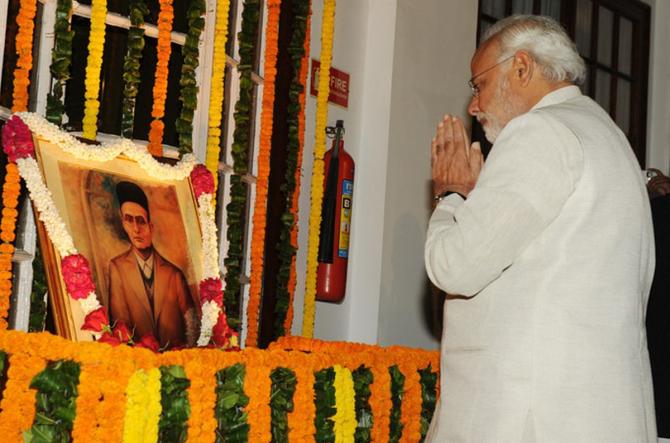
Interestingly, he points out that it was only geographically speaking that India as a land and a state was absolutely independent of any other non-Indian powers when an Alauddin Khilji or an Aurangzeb ruled over it.
However, that kind of independence proved a veritable death warrant to the Hindu nation, and impelled Rana Sanga, Maharana Pratap, Guru Gobind Singh, Bir Banda, Shivaji and Bajirao to fight and ultimately win and establish a Hindu empire under the Marathas, the Rajputs, the Sikhs and the Gurkhas throughout our motherland.
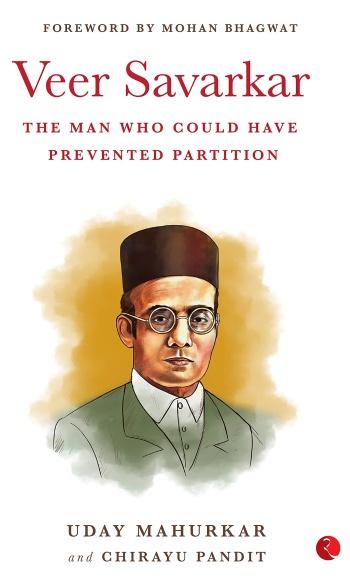
Their actions saved our Hindudom or Hindutva from the clutches of non-Hindu aggression, he said.
This, he emphasised, proves that mere geographical independence does not mean the independence of the Hindu nation.
Explaining the real meaning of Swarajya, Savarkar opines that for Hindus, Hindusthan's independence is worthwhile only if it ensures their Hindutva -- their religious, racial and cultural identity.
Swarajya is thus more than the mere geographical independence of a stretch of earth called India.
There was no point in fighting and sacrificing one's life for a Swarajya (mere territorial independence) at the cost of our Svatva (self-existence) or Hindutva itself!
Excerpted from Veer Savarkar: The Man Who Could Have Prevented Partition by Uday Mahurkar and Chirayu Pandit, with the kind permission of the publishers, Rupa Publications India Pvt Ltd.
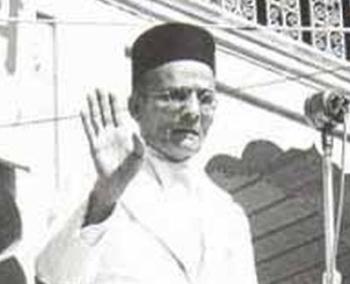
Feature Presentation: Rajesh Alva/Rediff.com

